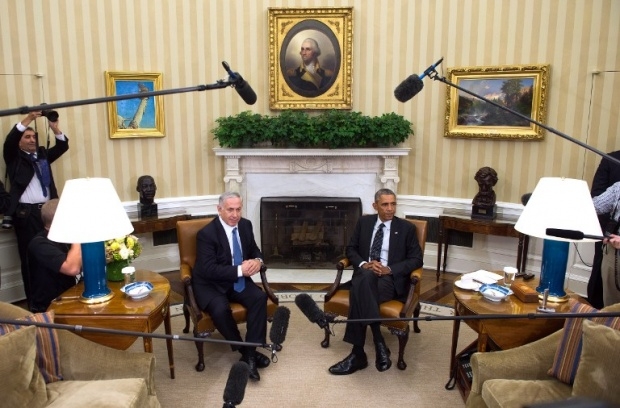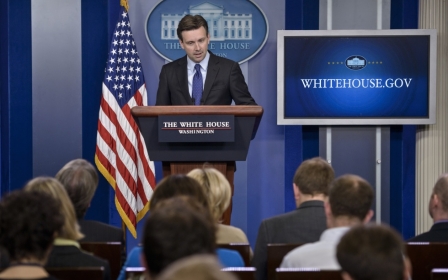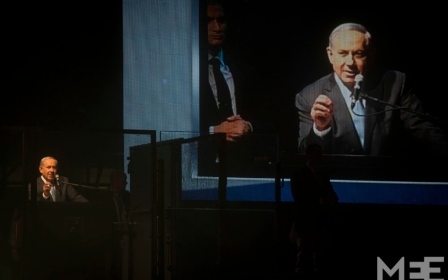ANALYSIS: Two more years of Netanyahu-Obama drama
In the final days of campaigning, Netanyahu abandoned negotiations on a Palestinian state - the bedrock of US-backed peace talks (AFP)

"Personal relations between the two leaders were always terrible,” Josh Ruebner, from the US Campaign to End the Israeli Occupation, told Middle East Eye (AFP)
Published date: 19 March 2015 09:23 GMT
|
Last update: 9 years 8 months ago
NEW YORK - The White House responded icily to Benjamin Netanyahu’s election success on Wednesday, amid simmering rows with the Israeli Prime Minster over peace talks with Palestinians and curbing Iran’s nuclear programme.
Netanyahu promised to form a new coalition government after Israeli voters swung right in this week’s ballot. In the final days of campaigning, he abandoned a commitment to negotiate a Palestinian state that had been the bedrock of more than two decades of US-backed peace talks.
“It has been the policy of the US for more than 20 years that a two-state solution is the goal of resolving the conflict,” White House spokesman Josh Earnest said on Wednesday about an elusive deal that has been pursued by both Republican and Democrat administrations.
“Based on Prime Minister Netanyahu’s comments, the US will reevaluate our position and the path forward.”
The White House was also alarmed by what it called Netanyahu’s “divisive rhetoric”, when he indicated that left-wingers were bringing Israeli Arab voters to the polls “in droves” to sway the ballot against him, Earnest said.
“Rhetoric that seeks to marginalise one segment of their population is deeply concerning,” Earnest told reporters, as it emerged that Netanyahu’s Likud had won 30 seats in the 120-member Knesset, defeating the centre-left Zionist Union on 24 seats.
An editorial in The New York Times newspaper echoed his concerns. It blasted Netanyahu for a “racist rant” against Arab Israelis, for “aggressively building” settlements on Palestinian land and for never taking peace talks seriously.
Analysts were divided over whether Netanyahu’s statement marked a genuine policy shift, his frustration over stalled peace talks – or even a gambit to shore up right-wing support ahead of an election that many predicted he would lose.
But they generally agreed that it would drag out a strained relationship between two leaders who have repeatedly clashed over Iran’s nuclear project and Israeli settlement building – most likely until Obama leaves office in 2017.
“Personal relations between the two leaders were always terrible,” Josh Ruebner, from the US Campaign to End the Israeli Occupation, told Middle East Eye. “Nothing will happen in these final two years to improve that chemistry."
“The only open question is whether Netanyahu’s reelection will trigger a rethink of options that the Obama administration has.”
The White House is not likely to withdraw military, economic or diplomatic support to Israel, but the election may influence Obama’s next move on the talks between Israelis and Palestinians that broke down last year, he said.
Neri Zilber, an analyst from The Washington Institute for Near East Policy, said Obama and Netanyahu would likely “downplay their differences”. The White House may venture a new “framework about the contours of a negotiated solution,” he said.
Natan Sachs, an Israel expert at Brookings Institution, another Washington-based policy institute, agreed, saying he predicted no big changes to a policy that has failed to make progress in recent years. “Continuity is the name of the game right now,” he told MEE.
While Netanyahu has been criticised for clashing with a US president, Obama is mindful that Israel has broad cross-party support in the US. “The Obama administration will try to keep the Israel-Palestine issue on a low simmer and let the next president deal with it,” Ruebner told MEE.
But by “slamming the door shut on two states,” Netanyahu may further alienate Europeans and some Democrats in the US who are growing concerned by Israel’s settlement-building and military operations in Gaza, Ruebner added.
“We’re going to see mainstream US think tanks start talking about what comes next in the post-peace process paradigm, what are the new realities?” he told MEE. “These conversations will happen in all kinds of places, though not within the White House.”
It has been no secret that Obama and Netanyahu have had a strained relationship in recent years – but it reached a new low this month when the Israeli spoke before Congress and debunked Obama’s plan for halting Iran’s nuclear programme.
The address was widely viewed as a breach of protocol and embarrassing for a sitting president, while also undercutting his efforts to strike a deal with Russia, China, Britain, France and Germany to stop Tehran from being able to build nuclear weapons.
Netanyahu’s election success means he will likely remain prime minister – giving him a platform for criticising a deal that he says will leave Tehran with much of the infrastructure it needs to enrich uranium and build doomsday weapons.
According to Sachs, Netanyahu is the “most vocal force” against a deal with Iran that many Republican lawmakers in the US eye with suspicion. “It won’t be a surprise if we see more political drama in Washington DC and between Washington and Jerusalem,” he told MEE.
“If there is a deal, we will definitely see confrontation with Israel over it. But Israel is just the front for a broader issue with the Sunni Arab states - Saudi Arabia, the United Arab Emirates - who are just as opposed to the deal as Israel is,” he added.
On Wednesday, Republicans – including some of the likely candidates for a 2016 race for the White House – voiced support for Netanyahu. Scott Walker, a Wisconsin lawmaker, said the “US and Israel must stand together and stand up to Iran”.
Former Arkansas Governor, Mike Huckabee, said in a statement: “I am embarrassed that the Obama administration trusts Iran yet undermines and undercuts Israel. The polls have closed, the people have spoken and it is time for the US government to stand with Israel once again.”
Secretary of State John Kerry and other negotiators are scrambling to reach a framework deal on Iran by the end of the month. For Zilber, Israel cannot take military action alone and will be bound by any deal that the White House strikes.
“Israel will have to follow any kind of diplomatic agreement that US and the international community reaches on Iran’s nuclear programme,” he told MEE. “The notion that Israel can torpedo an international agreement with Iran is unlikely, even after this resounding Netanyahu victory.”
New MEE newsletter: Jerusalem Dispatch
Sign up to get the latest insights and analysis on Israel-Palestine, alongside Turkey Unpacked and other MEE newsletters
Middle East Eye delivers independent and unrivalled coverage and analysis of the Middle East, North Africa and beyond. To learn more about republishing this content and the associated fees, please fill out this form. More about MEE can be found here.




